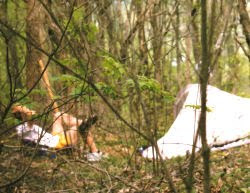 a typical stealth camp (photo by JHY) |
by JHY
Most of us long-distance hikers have done it: stealth camping- the practice of sneaking off into a corner of a fencerow, a woodlot, or some other spot where we are pretty sure we won't be discovered overnight, even though we know it's illegal to camp there. "What's the harm," we ask. Most of us practice leave-no trace camping. We pitch a small tent, light no fire, break no branches, and are gone in a few hours. If we are careful, no one will ever know we were there.
But, stealth camping has the potential to cause lasting consequences for hikers who will come after us, if not for ourselves.
Personal Consequence
Let's say that you are illegally camping on public land. For example, in Michigan you can't camp in State Game areas in the summer. If you are caught there, you are likely to get a hefty fine. If you are illegally camping in a wildlife preserve, not only might you get a fine, but the rule was probably set in order to not disrupt wildlife. You've challenged the entire reason that the land was set aside in the first place. If you are on private land, you could be subject to criminal trespass law.
Consequences for the Trail
If enough people (and this might only be one person) camp illegally, there is the chance that the trail would lose the privilege of crossing that land. This is particularly true in New York along the Finger Lakes Trail, and Minnesota along the Superior Hiking Trail. Agreements with many private landowners have created continuous portions of off-road trail, but usually with the stipulation that no camping is allowed. Your one night of enjoyment might remove miles of off-road trail from the North Country Trail system. If the lost section is between a couple of other pieces needed for connections, if a road walk must be substituted, it might be much longer than the piece lost from one owner.
If public land is involved, consider how significant the ramifications might be. In Pennsylvania, you can't camp in State Game Lands at any time of year. Think about what the states might do if a lot of people were caught camping in State Game Lands. The North Country Trail is there at all by permission. Those lands were not set aside for hikers, but for hunters. The trail is a guest. Think of all the years of work creating routes and building trail that could be lost if a few people decide that they think the rules are silly, and the NCT would be asked to leave.
Don't Ignore It
Bragging about stealth camping to our friends should not result in smirks and knowing nods in commiseration of the difficulty of backpacking along the entire NCT at this point. It should result in worried looks and admonitions. People who are friends of the North Country Trail for the future will not stealth camp, or encourage it in others.
Look for ways to get involved and promote the creation of legal campsites at appropriate distances along the trail. . Farmers are often willing to let you camp in their fencerow if they are asked. Nature preserves' rules should not be challenged by a flippant hiker. Planning ahead well can often solve the logistic problems. I now try to avoid the practice... Let's look ahead to a great completed trail, not just to our own personal pleasure for a weekend.


No comments:
Post a Comment